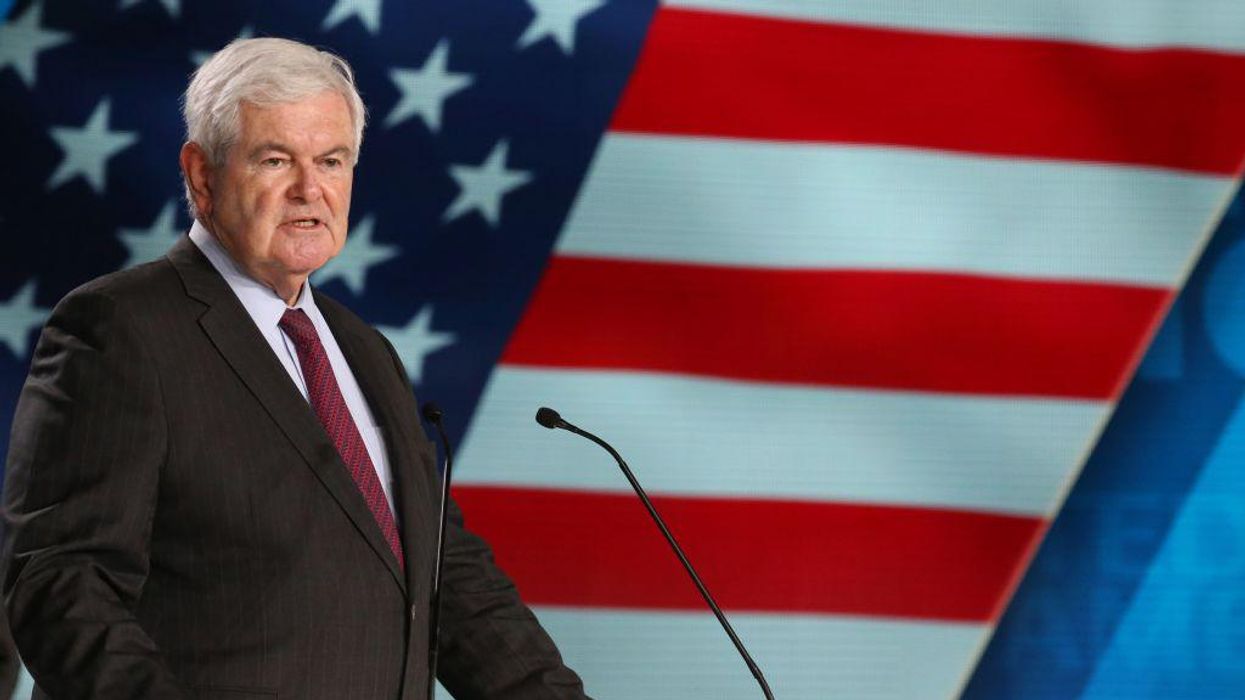
ZAKARIA ABDELKAFI/AFP via Getty Images

Former President Donald Trump has enlisted former Republican House Speaker and 2012 presidential candidate Newt Gingrich to design a policy agenda that Republicans can use to win back control of Congress in 2022.
Politico reported Tuesday that Trump invited Gingrich, his former chief of staff Mark Meadows, and Sen. Lindsey Graham (R-S.C.) to join him at his Mar-a-Lago club in Florida and begin work on a new version of the "Contract with America" for Republicans to rally behind in the upcoming midterm elections. The document will attempt to transform the "America First" principles of Trump's presidential campaigns into "a policy priority for 2022 and beyond" on everything from trade to immigration.
Gingrich told Politico in an interview that the document won't be ready "anytime soon" but he did make suggestions about what it should look like.
"It should be positive," Gingrich said. "School choice, teaching American history for real, abolishing the '1619 Project,' eliminating critical race theory and what the Texas legislature is doing. We should say, 'Bring it on.'"
Under Gingrich's leadership in 1994, Republicans crafted the "Contract with America," a set of policies and laws they promised to vote on if they won control of the House of Representatives. That year Republicans won 52 seats in the House and nine seats in the Senate, a revolution that forced President Bill Clinton to moderate and work with Congress to reform welfare, balance the budget, and get tough on crime.
That Trump would recruit Gingrich for a new contract-style agenda suggests that in exile from Washington, D.C., and with 2022 and 2024 in view, the former president is attempting to build what his previous campaigns for the presidency lacked: A policy platform every Republican could run on.
Trump's vague promises to "Make America Great Again" during his two campaigns for president worked as slogans that rallied his supporters but never translated into a governing agenda for the Republican Party. The ex-president's skepticism of free trade, opposition to reforming entitlement programs, and focus on border security and culture war issues was never fully embraced by establishment Republicans. The result was that the major victories Trump won for his base were accomplished via executive order, and subsequently undone by President Joe Biden.
The Trump presidency secured few major legislative victories. Efforts to keep the Republican Party's longstanding promise to repeal and replace Obamacare failed miserably, and Trump's inability to rally legislators around a unified health care plan was a factor in that failure. Even with Republicans in complete control of Congress from 2016 to 2018, the government spent $2.3 trillion — more than President Obama spent during his first two years in office.
Trump's greatest legislative achievement was the 2017 tax cut, which reduced the corporate tax rate and doubled the child tax credit. But it's easy to rally Republicans around cutting taxes, and the 2017 law fell far short of transformational tax reforms supported by conservatives.
Perhaps the greatest evidence of Trump's previous neglect of policy and disunity in the GOP was the Republican National Committee's inability to create a platform during the 2020 presidential election.
A new "Contract with America"-style campaign agenda could unite Trump-supporting Republicans and provide a blueprint for what a governing agenda will look like. Concrete promises might become concrete legislative accomplishments, as they did in 1994.
But it remains to be seen if the Republican Party, let alone the American people, will support those promises.